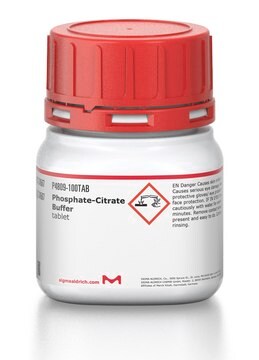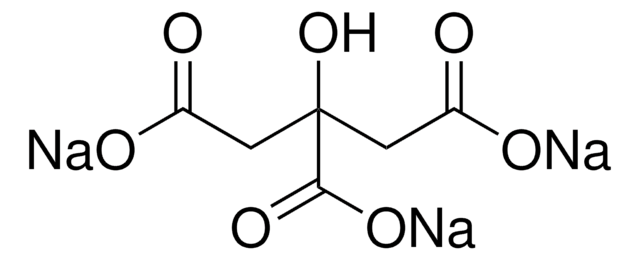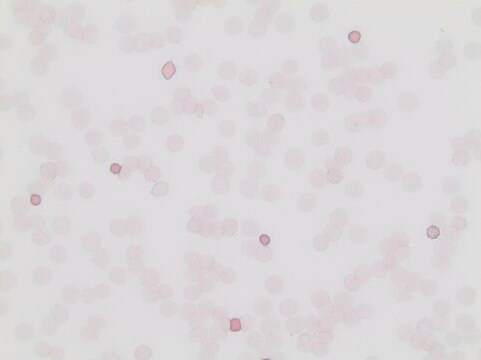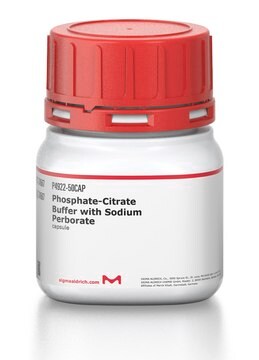Alle Fotos(1)
Wichtige Dokumente
C2488
Citrate Buffer Solution, 0.09 M
Synonym(e):
Citric Acid Buffer Solution
Anmeldenzur Ansicht organisationsspezifischer und vertraglich vereinbarter Preise
Alle Fotos(1)
About This Item
UNSPSC-Code:
12161700
eCl@ss:
32129211
NACRES:
NA.25
Empfohlene Produkte
Beschreibung
Contains 1% chloroform
pH 4.8 at 25 °C.
Qualitätsniveau
Form
solution
Konzentration
0.09 M
pH-Wert
4.8 (25 °C)
Anwendung(en)
diagnostic assay manufacturing
Lagertemp.
2-8°C
Verwandte Kategorien
Allgemeine Beschreibung
Citrate Buffer Solution, 0.09 M, is a high-quality biochemical buffer solution commonly employed in various research applications. Its applications include use in acid phosphatase reactions alongside p-nitrophenyl phosphate (pNPP) enzyme substrate. Citrate Buffer is also used for the isolation of RNA from cells and tissues. In addition, it is also used as a background electrolyte for separating sulfonamides utilizing capillary zone electrophoresis. With its superior buffering capacity and ability to maintain a stable pH, Citrate Buffer Solution, 0.09 M is an excellent choice for any researcher in need of reliable performance.
Anwendung
Citrate Buffer Solution, 0.09 M has been used as a heat-induced antigen retriever on formalin-fixed paraffin-embedded (FFPE) tissue sections during immunohistochemistry (IHC) experiments. It has also been used in the preparation of hybridization solutions for fluorescence in situ hybridization (FISH) procedures.
Sonstige Hinweise
Unit definition: One unit of acid phosphatase will hydrolyze 1.0 μmole of p-nitrophenyl phosphate per, minute at pH 4.8 at 37 °C.
Signalwort
Warning
H-Sätze
Gefahreneinstufungen
Carc. 2 - STOT RE 2 Oral
Zielorgane
Liver,Kidney
Lagerklassenschlüssel
12 - Non Combustible Liquids
WGK
WGK 2
Flammpunkt (°F)
Not applicable
Flammpunkt (°C)
Not applicable
Persönliche Schutzausrüstung
Eyeshields, Faceshields, Gloves, type ABEK (EN14387) respirator filter
Hier finden Sie alle aktuellen Versionen:
Besitzen Sie dieses Produkt bereits?
In der Dokumentenbibliothek finden Sie die Dokumentation zu den Produkten, die Sie kürzlich erworben haben.
Kunden haben sich ebenfalls angesehen
I Gkouveris et al.
Histology and histopathology, 32(10), 1065-1076 (2017-01-17)
Signal transducer and activator of transcription 3 (STAT3) and mitogen activated protein kinases (MAPKs), including ERK and JNK, have been implicated in oral squamous cell carcinoma (OSCC) development and progression. Our purpose was to evaluate the levels of activated STAT3
Argyrios G Daskalopoulos et al.
Oral surgery, oral medicine, oral pathology and oral radiology, 129(5), 493-513 (2020-03-17)
Toll-like receptors (TLRs) may promote or inhibit tumor progression. The aim of this study was to assess the expression of TLR4 and TLR9 and their downstream targets in oral tongue squamous cell carcinoma (OTSCC) in correlation with histopathologic parameters and
Nikolaos G Nikitakis et al.
Oral surgery, oral medicine, oral pathology and oral radiology, 125(2), 164-171 (2017-12-19)
Primary oral malignant melanoma (POMM) is a rare type of malignancy with a very poor prognosis, the molecular pathogenesis of which remains elusive. The aim of this study was to assess the expression status of signal transducer and activator of
Greg C Bristow et al.
Cell reports, 31(3), 107536-107536 (2020-04-23)
Chromosome 16p11.2 duplications dramatically increase risk for schizophrenia, but the mechanisms remain largely unknown. Here, we show that mice with an equivalent genetic mutation (16p11.2 duplication mice) exhibit impaired hippocampal-orbitofrontal and hippocampal-amygdala functional connectivity. Expression of schizophrenia-relevant GABAergic cell markers
Zn2+ efflux through lysosomal exocytosis prevents Zn2+-induced toxicity.
Kukic I, Kelleher SL, and Kiselyov K
Journal of Cell Science, 127(Pt 14), 3094-3103 (2014)
Unser Team von Wissenschaftlern verfügt über Erfahrung in allen Forschungsbereichen einschließlich Life Science, Materialwissenschaften, chemischer Synthese, Chromatographie, Analytik und vielen mehr..
Setzen Sie sich mit dem technischen Dienst in Verbindung.










